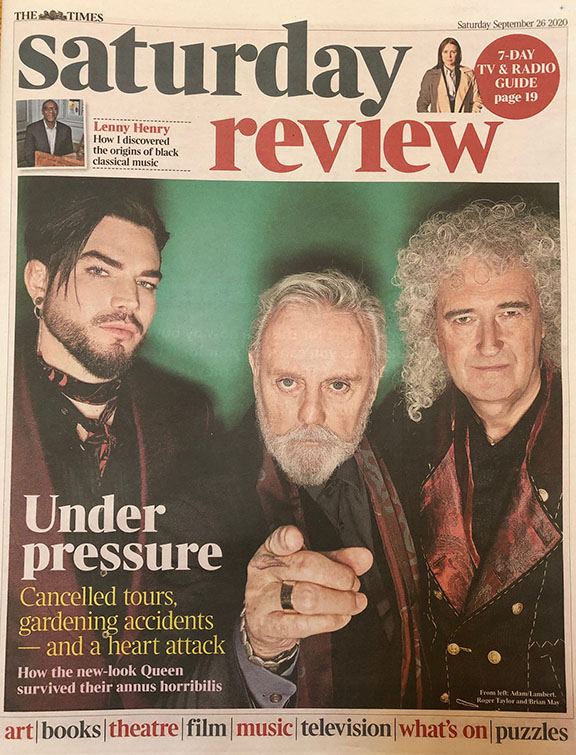Queen were the cover story in Friday’s Culture Supplement in The Times:
Under pressure: Queen on cancelled tours, gardening accidents — and a heart attack
Queen and their singer Adam Lambert talk to Will Hodgkinson about the future of live gigs and memories of Freddie
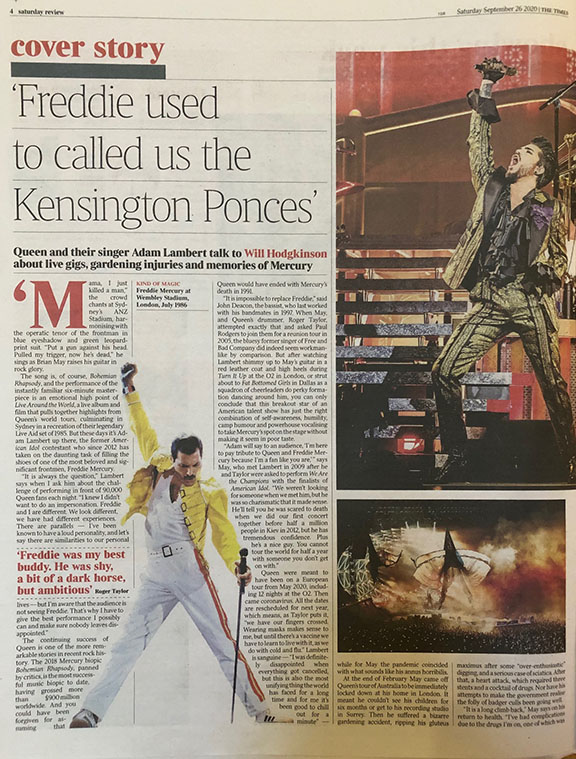
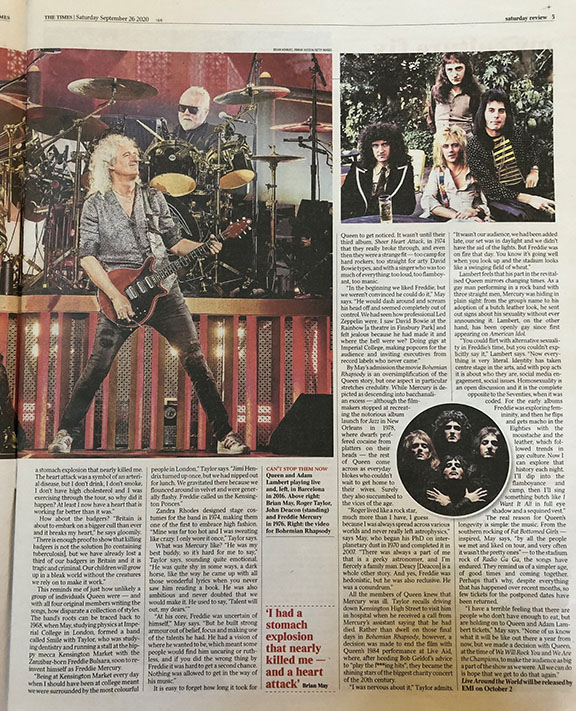
THE TIMES
24 September 2020 by Will Hodgkinson
‘Mama, I just killed a man,” the crowd chants at Sydney’s ANZ Stadium, harmonising with the operatic tenor of the frontman in blue eye shadow and green leopard-print suit. “Put a gun against his head. Pulled my trigger, now he’s dead,” he sings as Brian May raises his guitar in theatrical rock glory.
The song is, of course, Bohemian Rhapsody, and the performance of the instantly familiar six-minute masterpiece is an emotional high point of Live Around the World, a live album and film that pulls together highlights from Queen’s world tours, culminating in Sydney in a recreation of their legendary Live Aid set of 1985. But these days it’s Adam Lambert up there, the former American Idol contestant who since 2012 has taken on the daunting task of filling the shoes of one of the most beloved and significant frontmen, Freddie Mercury.
“It is always the question,” Lambert says when I ask him about the challenge of performing in front of 90,000 Queen fans each night. “I knew I didn’t want to do an impersonation. Freddie and I are different. We look different, we have had different experiences. There are parallels – I’ve been known to have a loud personality, and let’s say there are similarities to our personal lives – but I’m aware that the audience is not seeing Freddie. That’s why I have to give the best performance I possibly can and make sure nobody leaves disappointed.”
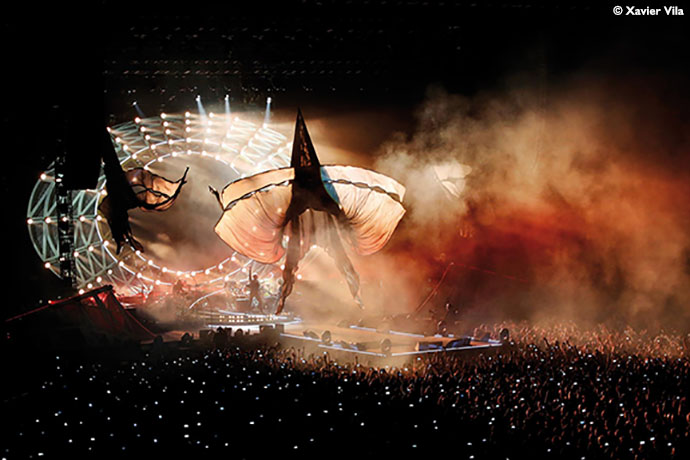
XAVIER VILA
The continuing success of Queen is one of the more remarkable stories in recent rock history. The 2018 Mercury biopic Bohemian Rhapsody, panned by critics, is the most successful music biopic to date, having grossed more than $900 million worldwide. And you could have been forgiven for assuming that Queen would have ended with Mercury’s death in 1991.
“It is impossible to replace Freddie,” said John Deacon, the bassist, who last worked with his bandmates in 1997. When May, and Queen’s drummer, Roger Taylor, attempted exactly that and asked Paul Rodgers to join them for a reunion tour in 2005, the bluesy former singer of Free and Bad Company did indeed seem workmanlike by comparison. But after watching Lambert shimmy up to May’s guitar in a red leather coat and high heels during Turn It Up at the O2 in London, or strut about to Fat Bottomed Girls in Dallas as a squadron of cheerleaders do perky formation dancing around him, you can only conclude that this breakout star of an American talent show has just the right combination of self-awareness, humility, camp humour and powerhouse vocalising to take Mercury’s spot on the stage without making it seem in poor taste.
“Adam will say to an audience, ‘I’m here to pay tribute to Queen and Freddie Mercury because I’m a fan like you are,’ ” says May, who met Lambert in 2009 after he and Taylor were asked to perform We Are the Champions with the finalists of American Idol. “We weren’t looking for someone when we met him, but he was so charismatic that it made sense. He’ll tell you he was scared to death when we did our first concert together before half a million people in Kiev in 2012, but he has tremendous confidence. Plus he’s a nice guy. You cannot tour the world for half a year with someone you don’t get on with.”
Queen were meant to have been on a European tour from May 2020, including 12 nights at the O2. Then came coronavirus. All the dates are rescheduled for next year, which means, as Taylor puts it, “we have our fingers crossed. Wearing masks makes sense to me, but until there’s a vaccine we have to learn to live with it, as we do with cold and flu.”
Lambert is sanguine – “I was definitely disappointed when everything got cancelled, but this is also the most unifying thing the world has faced for a long time and for me it’s been good to chill out for a minute” – while for May the pandemic coincided with what sounds like his annus horribilis.
At the end of February May came off Queen’s tour of Australia to be immediately locked down at his home in London. It meant he couldn’t see his children for six months or get to his recording studio in Surrey. Then he suffered a bizarre gardening accident, ripping his gluteus maximus after some “over-enthusiastic” digging, and a serious case of sciatica. After that, a heart attack, which required three stents and a cocktail of drugs. Nor have his attempts to make the government realise the folly of badger culls been going well.
“It is a long climb back,” May says on his return to health. “I’ve had complications due to the drugs I’m on, one of which was a stomach explosion that nearly killed me. The heart attack was a symbol of an arterial disease, but I don’t drink, I don’t smoke, I don’t have high cholesterol and I was exercising through the tour, so why did it happen? At least I now have a heart that is working far better than it was.”
How about the badgers? “Britain is about to embark on a bigger cull than ever and it breaks my heart,” he says gloomily. “There is enough proof to show that killing badgers is not the solution [to containing tuberculosis], but we have already lost a third of our badgers in Britain and it is tragic and criminal. Our children will grow up in a bleak world without the creatures we rely on to make it work.”
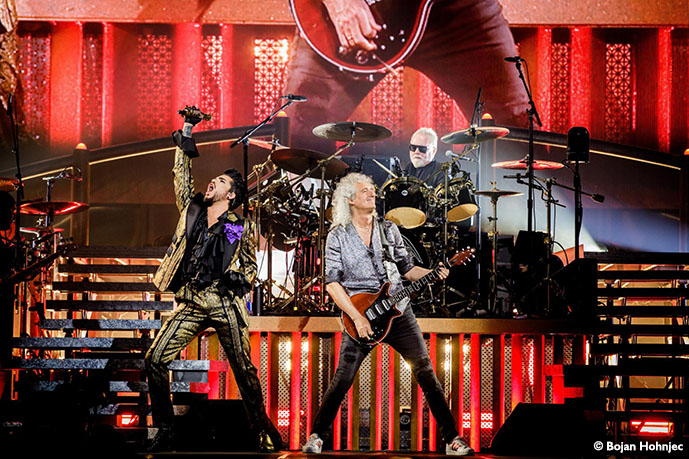
Queen and Adam Lambert playing live
BOJAN HOHNJEC
This reminds me of just how unlikely a group of individuals Queen were – and with all four original members writing the songs, how disparate a collection of styles. The band’s roots can be traced back to 1968, when May, studying physics at Imperial College in London, formed a band called Smile with Taylor, who was studying dentistry and running a stall at the hippy mecca Kensington Market with the Zanzibar-born Freddie Bulsara, soon to reinvent himself as Freddie Mercury.
“Being at Kensington Market every day when I should have been at college meant we were surrounded by the most colourful people in London,” Taylor says. “Jimi Hendrix turned up once, but we had nipped out for lunch. We gravitated there because we flounced around in velvet and were generally flashy. Freddie called us the Kensington Ponces.”
Zandra Rhodes designed stage costumes for the band in 1974, making them one of the first to embrace high fashion. “Mine was far too hot and I was sweating like crazy. I only wore it once,” Taylor says.
What was Mercury like? “He was my best buddy, so it’s hard for me to say,” Taylor says, sounding quite emotional. “He was quite shy in some ways, a dark horse, like the way he came up with all those wonderful lyrics when you never saw him reading a book. He was also ambitious and never doubted that we would make it. He used to say, ‘Talent will out, my dears.’ ”
“At his core, Freddie was uncertain of himself,” May says. “But he built strong armour out of belief, focus and making use of the talents he had. He had a vision of where he wanted to be, which meant some people would find him uncaring or ruthless, and if you did the wrong thing by Freddie it was hard to get a second chance. Nothing was allowed to get in the way of his music.”
It is easy to forget how long it took for Queen to get noticed. It wasn’t until their third album, Sheer Heart Attack, in 1974 that they really broke through, and even then they were a strange fit – too camp for hard rockers, too straight for arty David Bowie types, and with a singer who was too much of everything: too loud, too flamboyant, too manic.
“In the beginning we liked Freddie, but we weren’t convinced he could do it,” May says. “He would dash around and scream his head off and seemed completely out of control. We had seen how professional Led Zeppelin were. I saw David Bowie at the Rainbow [a theatre in Finsbury Park] and felt jealous because he had made it and where the hell were we? Doing gigs at Imperial College, making popcorn for the audience and inviting executives from record labels who never came.”
By May’s admission the movie Bohemian Rhapsody is an oversimplification of the Queen story, but one aspect in particular stretches credulity. While Mercury is depicted as descending into bacchanalian excess – although the film-makers stopped at recreating the notorious album launch for Jazz in New Orleans in 1978, where dwarfs proffered cocaine from platters on their heads – the rest of Queen come across as everyday blokes who couldn’t wait to get home to their wives. Surely they also succumbed to the vices of the age.
“Roger lived like a rock star, much more than I have, I guess because I was always spread across various worlds and never really left astrophysics,” says May, who began his PhD on interplanetary dust in 1970 and completed it in 2007. “There was always a part of me that is a geeky astronomer, and I’m fiercely a family man. Deacy [Deacon] is a whole other story. And yes, Freddie was hedonistic, but he was also reclusive. He was a conundrum.”
All of the members of Queen knew that Mercury was ill. Taylor recalls driving down Kensington High Street to visit him in hospital when he received a call from Mercury’s assistant saying that he had died. Rather than dwell on those final days in Bohemian Rhapsody, however, a decision was made to end the film with Queen’s 1984 performance at Live Aid, where, after heeding Bob Geldof’s advice to “play the f***ing hits”, they became the shining stars of the biggest charity concert of the 20th century.
“I was nervous about it,” Taylor admits. “It wasn’t our audience, we had been added late, our set was in daylight and we didn’t have the aid of the lights. But Freddie was on fire that day. You know it’s going well when you look up and the stadium looks like a swinging field of wheat.”
Lambert feels that his part in the revitalised Queen mirrors changing times. As a gay man performing in a rock band with three straight men, Mercury was hiding in plain sight: from the group’s name to his adoption of a butch leather look, he sent out signs about his sexuality without ever announcing it. Lambert, on the other hand, has been openly gay since first appearing on American Idol.
“You could flirt with alternative sexuality in Freddie’s time, but you couldn’t explicitly say it,” Lambert says. “Now everything is very literal. Identity has taken centre stage in the arts, and with pop acts it is about who they are, social media engagement, social issues. Homosexuality is an open discussion and it is the complete opposite to the Seventies, when it was coded. For the early albums Freddie was exploring femininity, and then he flips and gets macho in the Eighties with the moustache and the leather, which followed trends in gay culture. Now I can explore that history each night. I’ll dip into the flamboyance and camp, then I’ll sing something butch like I Want It All in full eye shadow and a sequined vest.”
The real reason for Queen’s longevity is simple: the music. From the southern rocking of Fat Bottomed Girls – inspired, according to May, “by all the people we met and liked on tour, and very often it wasn’t the pretty ones ” – to the arms-aloft stadium rock of Radio Ga Ga, the songs have endured. They remind us of a simpler age, of good times and coming together. Perhaps that’s why, despite everything that has happened over the past six months, so few of the tickets for the postponed dates have been returned.
“I have a terrible feeling that there are people who don’t have enough to eat, but are holding on to Queen and Adam Lambert tickets,” May says. “None of us know what it will be like out there a year from now, but we made a decision with Queen, at the time of We Will Rock You and We Are the Champions, to make the audience as big a part of the show as we were. All we can do is hope that we get to do that again.”
Live Around the World will be released by EMI on October 2.
